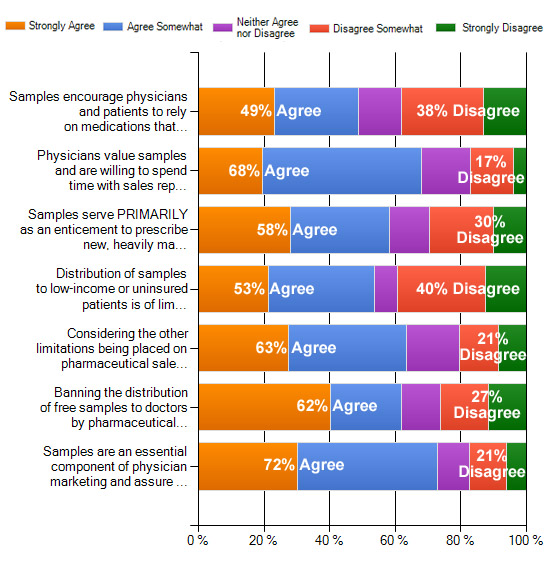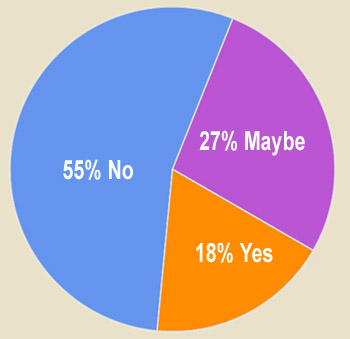Should Free Drug Samples Be Banned? (Survey ran from 16 August 2008 through 13 November 2008. N=132 respondents)
See Resources & Further Reading below…
According to The Prescription Project — which is funded by the Pew Charitable Trusts and which “seeks to eliminate conflicts of interest created by industry marketing by promoting policy change among academic medical centers, professional medical societies and public and private payers” — $18 billion a year goes to free drug samples. Other sources confirm that this number is in the right ballpark.
While the new PhRMA Code on Interactions with Healthcare Professionals bans free pens and lunches, it doesn’t apply to samples: “It is appropriate,” says the Code, “to provide product samples for patient use in accordance with the Prescription Drug Marketing Act.”
But the Prescription Project discounts the value to patients of free samples:
- Samples encourage physicians and patients to rely on medications that are expensive, but often not more effective than other available drugs. Research has shown that samples can increase physician prescribing of the marketed product, independent of the effect of detailing by industry sales representatives.
- Samples serve two distinct marketing purposes. Physicians value samples and are willing to spend time with sales representatives to get them. Secondly, samples serve as “starter” medications — an enticement to prescribe new, heavily marketed and generally more expensive medications. Once therapy has been initiated, patients and their insurers are likely to continue to pay for the new, costly drugs.
- Studies indicate that the majority of pharmaceutical samples are not dispensed to low-income or uninsured patients. Nevertheless, many physicians use samples, in part, to provide medications to needy patients. However, the inconsistent availability of samples may limit the utility of this approach.
Survey Results:
The overall results are summarized in charts below. Access a more detailed online Summary of Responses plus view comments from respondents here.
Respondents were asked to indicate their level of agreement or disagreement with the following general statements regarding pharmaceutical Rx drug sampling practices. (Response ranges: Strongly Agree, Somewhat Agree, Neither Agree Nor Disagree, Somewhat Disagree, Strongly Disagree):
- Samples encourage physicians and patients to rely on medications that are expensive, but often not more effective than other available drugs.
- Physicians value samples and are willing to spend time with sales representatives to get them.
- Samples serve PRIMARILY as an enticement to prescribe new, heavily marketed and generally more expensive medications.
- Distribution of samples to low-income or uninsured patients is of limited utility in reducing the burden of high drug costs for these patients.
- Considering the other limitations being placed on pharmaceutical sales reps — eg, no free gifts to physicians — samples are the BEST way for sales reps to gain access to physicians.
- Banning the distribution of free samples to doctors by pharmaceutical sales representatives will be detrimental to patients (eg, patients will be forced to fill a prescription for a drug that may not be tolerable or efficacious for them).
- Samples are an essential component of physician marketing and assure market share growth for the drug. That is, without free samples, it is less likely that doctors will prescribe the drug as a first choice.

Should the distribution of free Rx drug samples to physicians by pharmaceutical sales representatives be banned?:
- Yes, definitely
- No, never
- Maybe, it depends

NOTE: 49% of respodents said they were VERY supportive of the pharma industry and another 33% said they were SOMEWHAT supportive of the industry. 21% said they were a pharmaceutical, biotech, or drug device company employee (not a sales rep) and 14% said they were pharma sales reps. Another 15% said they were employed at an ad agency/marketing/communications or other company having pharmaceutical companies as clients and 18% said they were a Physician, nurse, or other healthcare professional/medical student. 21 % said they were employed at an independent consuting company and 11% were members of the general public “unaligned with pharma industry.”




![6 Digital Tools at the Center of Healthcare Digitalization [INFOGRAPHIC]](http://ec2-54-175-84-28.compute-1.amazonaws.com/pharma-mkting.com/wp-content/uploads/2021/04/6DigitalTools_600px-100x70.jpg)




